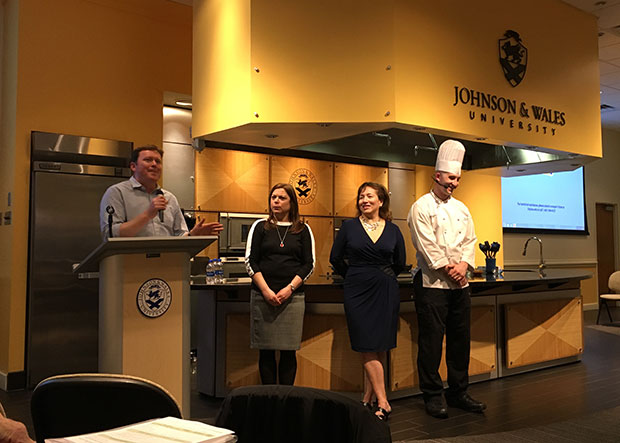Eat. Sleep. Work. Repeat.
By JWU Media Relations
May 2018

Lifestyle Medicine Symposium Offers Healthy Recipe to Healthcare Pros
Prevention is the best medicine. When healthy eating is part of everyday choices, individuals can prevent diseases such as inflammation, diabetes, and cancer from developing into medical issues that require treatment. Healthcare professionals know this, but few can prescribe the recipe to their patients.
That was the focus of the "Third Annual Lifestyle Medicine Symposium," held for the first time at Johnson & Wales University on April 26, 2018. Presented by the Women's Medicine Collaborative at Lifespan, the symposium offered members of the Rhode Island health care community a three-hour educational program with insight into Lifestyle Medicine.
Lifestyle Medicine is an evidence-based approach to preventing, treating and even reversing diseases by replacing unhealthy behaviors with positive ones – such as eating healthfully, being physically active, managing stress, avoiding risky substance abuse, adequate sleep and having a strong support system.
Chef Todd Seyfarth, RD, CSSD, department chair/program director, was instrumental in bringing the symposium to campus, as part of JWU's ongoing effort to bridge its expertise in food and nutrition with medical programs.
Peg Miller, MD, FACP, chief, Women's Medicine for Lifespan Physician Group and Medical Director of the Women's Medicine Collaborate led the symposium. "We take care of people after their heart attack," she told the audience. "We need to turn off the faucet and get to the causes."
The facts indicate the faucet is leaking: 1 in 10 US adults have diabetes; 1 in 5 will have it by 2025. More than 84 million Americans have prediabetes; 9 out of 10 don't know they have it.
Miller shared research by the Diabetes Prevention Program Research Group that revealed that a "structured lifestyle change program" that included at least 150 minutes of physical activity per week resulted in a 58 percent reduction in the risk of Type 2 diabetes, making it more effective than frequently prescribed pharmaceuticals.
The keynote speaker, award-winning registered dietitian Evelyn Tribole, co-author of "Intuitive Eating," explained why she is not an advocate for dieting. "We cannot ethically recommend dieting. Diets are not sustainable and they cause harm," she stated. Instead, her recommendation is to allow give patients a culinary adventure through intuitive eating."
Another key to a healthy lifestyle is getting the right amount of sleep. No one yawned when Jared Minkel, PhD, psychologist, Lifespan Physician Group-Psychology, and director, Adult Behavioral Sleep Medicine Program, Rhode Island Hospital took to the podium. His energy and enthusiasm made it easy to understand the science of circadian rhythms, sleep/wake ratios, and most of all – the importance of "No portable electronic devices within 30 minutes of bedtime."
JWU's contribution to the program was a presentation by Allison Acquisto, RDN, LDN, associate professor, entitled "Take Comfort in Plant-Based Cuisine," which explored ways to bridge the gap between what Americans are eating and what they should be eating.
To that point, Chef Jonathan Poyourow introduced the audience to jackfruit. Jackfruit is the largest tree-borne fruit in the world. Common in Southeast Asian cuisine, it can weigh from 15-80 pounds. He demonstrated how to prepare Jackfruit Tostados and emphasized that replacing one or two meals with plant-centric ingredients can have a positive impact on one's overall health. Although jackfruit is an advanced ingredient for Americans, it is a common one elsewhere in the world. "Changing the way the world eats" goes in both directions – the symposium is another step towards the right path.
